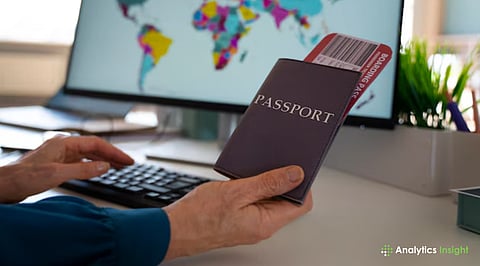

Embedded with electronic chips, e-passports store personal and biometric information, making travel documents safer.
E-passports blend traditional format with modern technology, paving the way for smarter travel documents in India.
Citizens can apply for e-passports in India, enjoying benefits like reduced identity fraud and streamlined travel procedures.
India is taking a significant step towards smarter and safer travel documents with the introduction of e-passports. By integrating modern technology with the traditional passport format, e-passports offer enhanced security features. In 2025, more citizens will have access to these chip-based passports. Let's dive into the key features, application process, and benefits of India's e-passport initiative.
An e-passport is the digital upgrade of a normal passport with an embedded electronic chip that holds personal information such as the holder's name, photo, date of birth, and biometric information.
It maintains universal guidelines set by the International Civil Aviation Organization (ICAO). The chip speeds up the immigration verification process and lessens the scope of forgery.
In 2022, India's Ministry of External Affairs (MEA) introduced a pilot program for e-passports, where 22,000+ official and diplomatic e-passports were issued.
The purpose is to introduce digital passports to the general citizen. The MEA has to print these, and Nasi, India Security Press, will print them. These digital passports are likely to improve both convenience and security.
Electronic chip – embedded on the back cover.
Personal information and biometric data storage.
It offers additional security against fraud and tampering.
Follows the ICAO global standards.
To speed up the immigration process, these passports can be verified by electronic entrances at airports.
The online process for applying for a digital passport is not different from applying for a physical passport.
To start the registration process, applicants must visit passportindia.gov.in.
The next step involves choosing "Fresh" or "Reissue" depending on the case, then picking "Normal" or "Tatkal" based on the requirement. Candidates must fill out the form cautiously.
Payments must be made online. A 36-page passport costs Rs. 1,500. T, buttkal services charge more.
Candidates must schedule an appointment to visit the nearest Passport Seva Kendra (PSK) or Post Office PSK.
It is mandatory to carry original documents, a printout of the application, and an appointment receipt. The employees will validate the documents and capture biometrics.
Depending on the case, a police verification is necessary before dispatching the passport.
After completing the verification, the passport is printed and delivered by post. If e-passports are available in the region, they will be issued automatically.
Also Read: Big Data Analytics: The Secret Tool Behind Covax and Vaccine Passport
An e-passport requires no different application, so anyone applying for a new passport or re-issuance is eligible. The system automatically issues one if the regional office has e-passport stock.
Applicants must carry these documents with them.
Aadhaar card.
Birth certificate - for minors.
PAN card.
Residential proof.
Old passport, if reissuing.
All these documents must be self-attested.
MEA states that with these e-passports, India will lessen airport processing time by up to 40%. Many countries already use automated passport control gates, which work quickly with chip-based passports.
The possibility of passport cloning or misuse has also been reduced significantly, which is why over 150 countries now use e-passports.
Validating the chip after receiving the passport.
It's important to handle the passport properly to avoid bending or scratching.
E-passports are not immediately required, but soon will become standard.
With an upgrade towards digital passports, India offers a welcome approach with improved security, faster processing, and seamless travel. While the application process remains the same, they offer better facilities.
